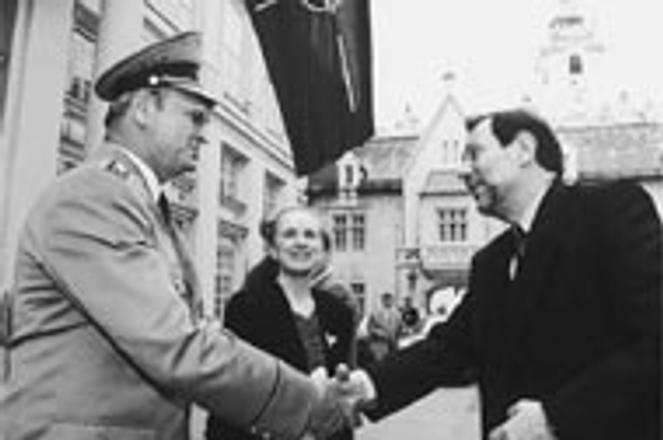The Slovak public may be voting in May in a referendum to decide whether NATO's flag should fly over their soil.Vladimír Hák
As Prime Minister Vladimír Mečiar dangles the idea of a public referendum on whether Slovakia should enter the joint military alliance NATO (North Atlantic Treaty Organization), recently-released polls show that more Slovaks are in favor of joining the joint American-European security structure.
In a surprise announcement on November 28, Mečiar said "the ideal date" for the Slovak public to decide whether the county should enter NATO would be May, 1997. Speaking later at the West European Union (WEU) Parliamentary Assembly in Paris on December 5, Mečiar outlined why a public vote should take place. "Slovakia's NATO membership, which is one of my Cabinet's priorities, begs for wider agreement than only from those who govern it," Mečiar explained. The Slovak Constitution, he added, requires such a vote, as the issue is a "fundamental question of crucial national importance."
As it stands now, public support for joining NATO is high, according to the results of an opinion poll released by the Focus agency on individuals who plan to participate in the referendum. The survey, conducted in November and based on the answers of 814 people, revealed that 64 percent of respondents favored entering NATO, while 36 percent did not.
In general, 41 percent of respondents answered "yes" to the question: "Do you Support Slovakia's entry into NATO?" an increase from 37.8 percent to a similar poll taken in April. Likewise, the number of individuals opposed to Slovakia entering NATO dropped between the April and November polls, from 25.3 percent to 23.5 percent. Offsetting to some extent the increased public will to join NATO was an alarming rise in respondents who answered "do not know" to the question; while in April it 10.5 percent, it shot up to 16.2 percent in November.
Thinning patience
While public support to enter NATO is climbing, US patience with the dragging of Slovakia's democratic reform is dropping. "We are still hoping the Slovak Cabinet will commit to a higher degree of internal reform as they have in Prague, Warsaw, Latvia or Estonia," State Department spokesman Nicholas Burns told the Slovak press agency TASR while attending a meeting of NATO officials on December 10 at the organization's headquarters in Brussels. "Sincerely speaking, I don't think Slovakia has made as much progress as any of these countries [in democratic reforms]."
Democratic reform is one of the four so-called "pillars" to NATO membership for the post-Communist countries in central and eastern Europe, according to NATO officials. The other three are economic transformation, military compatibility and readiness, and attention to minority rights.
Five days before Burns's remarks, Mečiar told the WEU Parliamentary Assembly "that the lack of political culture [in the country] cannot subdue the fact that there is a system that is democratic, functional and that is keeping pace with other [post-Communist countries'] democracies."


